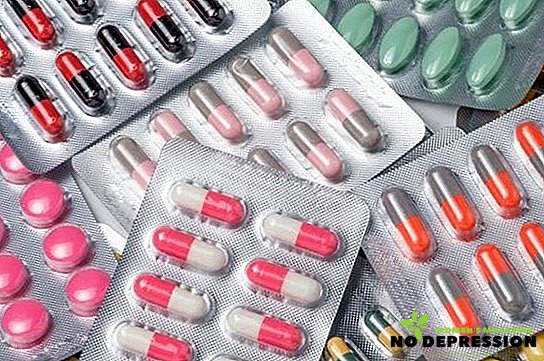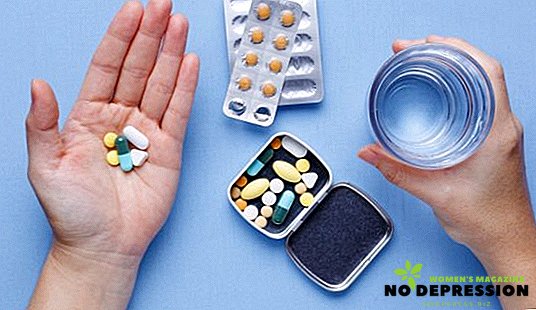Angina is an acute infectious disease that causes inflammation of the tonsils. Depending on the type and course of the disease, antibiotics may be prescribed. In our material we will tell you how to take pills for children and adults, and consider the most popular medicines.

When to use antibiotics
Prescribe antibiotics during a sore throat should the attending physician. Moreover, factors such as:
- age of the patient;
- type of sore throat (it can be viral or bacterial);
- nature of the disease.
 In order to decide whether to take such potent drugs, it is necessary to take into account the age, nature of a sore throat and the course of the disease. It is very simple to find out the age of the patient, so we will dwell on two other factors in more detail.
In order to decide whether to take such potent drugs, it is necessary to take into account the age, nature of a sore throat and the course of the disease. It is very simple to find out the age of the patient, so we will dwell on two other factors in more detail.
It should immediately be said that taking antibiotics is necessary only if the angina is bacterial in nature, since if it is caused by the appearance of a virus in the body, then antibiotics should not be used. Because it is so important to know the differences between these species.
Symptoms of viral disease:
- pain and sore throat;
- nasal congestion;
- cough;
- the appearance of ulcers on the mucous throat;
- possible increase in body temperature up to +38 degrees;
- absence of pus on the tonsils with reddened throat.
But bacterial sore throat appears a little differently:
- a sharp jump in temperature to +39 degrees;
- sore throat and suppuration on tonsils;
- nausea;
- swollen lymph nodes;
- the appearance of a small skin rash.
The main difference is that when the bacterial form of sore throat is rarely cough, but there will always be pus on the tonsils. Knowing the clear signs of this disease, you can easily distinguish between bacterial tonsillitis and viral sore throat, even without testing.
Another important factor in deciding on the appointment of antibiotics is the nature of the disease. Here it is important to understand whether a sore throat is favorable or gives complications. The main signs of complications include:

- The appearance of pain in the ears.
- General deterioration of health.
- Increased sore throat.
- The appearance of unpleasant sensations when turning the head.
- Temperatures above +38 degrees last more than a week.
- Headache, chest pain.
If you find any of these symptoms, the doctor will most likely prescribe antibiotics, but in the absence of complications, such highly active drugs are usually not prescribed.
Antibiotics for adults and children
If you want to avoid complications, taking medications, especially antibiotics, should take place under strict medical supervision.
For adults
The most well-known and effective drugs for angina include:
| Group name | Preparations | average cost |
|---|---|---|
| Amoxicillin | Amosin, Solutav, Flemoxin | Up to 200 rubles per pack of funds |
| Ampicillin | Dekapen, Sulacillin, Ampisid | In the area of 60-300 rubles |
| Erythromycin | Gruninamycin | 30-260 rubles |
| Josamycin | Vilprafen | Up to 400 rubles |
For kids
Antibiotics are prescribed to children only after all tests have been taken and a small patient is examined. Most often, the following groups of drugs are prescribed for the bacterial form of this disease:
- Penicillin. Are the safest.
- Macrolides. The course of taking such tablets should not exceed three days.
- Cephalosporins. They are prescribed only if there is an allergy to other types of pills.
The most effective means are considered: Augmentin, Hemomitsin, Cefotaxime, Levofloxacin, Tsifran.
Characteristics of the most famous drugs for angina
Drugs prescribed depending on the type of disease:
- Cephalosporins are prescribed for the lacunar form.
- With purulent - penicillin antibiotics (also with their help, follicular angina is treated).
- Streptococcal disease involves treatment with cephalosporins and penicillin antibiotics.
Let's also take a closer look at the main drugs prescribed for tonsillitis, their action and contraindications.
Flemoxine Solutab
This medicine has proven to be excellent in the acute form of tonsillitis. The tool is quickly absorbed, due to which the maximum concentration of the drug is achieved in a short time. Available in tablet form dosage of 125, 250, 500 and 1000 mg. The course depends on the complexity of angina. If we talk about a light form, then Flemoxin is taken within 7 days, 2 g per day.
This medication also has side effects:
- allergy;
- itching;
- diarrhea;
- Quincke swelling.
But in case of violation of the liver from this antibiotic should be abandoned.

Azithromycin
Suitable for both children and adults. Shows excellent results in the fight against streptococci and staphylococci. Rapidly absorbed, penetrates the tissues, skin, respiratory tract. Dosage: 1 tablet per day for 5 days. Side effects include vomiting, drowsiness, stomach pain, and headaches.
Augmentin
Augmentin aims to combat infections caused by the entry of bacteria into the body. Available in the form of syrups, tablets. For adults and children from 12 years, the dosage is as follows: three times a day, 125 ml of the product. When angina is recommended to drink an antibiotic for at least 7 days. Side effects of taking Augmentin include:
- rash;
- constipation;
- weakness;
- insomnia.
There are a number of contraindications: kidney disease, pregnancy.
Ceftriaxone
For purulent tonsillitis, ceftriaxone is administered intramuscularly. This antibiotic copes well with bacteria that are resistant to penicillin group drugs. Children up to 12 years old are prescribed the drug in a dosage of 20 ml per 1 kg of summer mass. Dosage for adults is different: 2 g of ceftriaxone once a day.
When taking the funds may occur such side effects as:
- skin rash;
- stomatitis;
- serum sickness.
Sumamed
This drug should be taken only under the constant supervision of an ENT. You should drink it with care to children, because the child's body is very sensitive to the main components of the drug. But the result from the reception of Sumamed will be visible already on the second day. Instructions for use: drink 500 mg of the drug per day for five days.
Side effects are as follows:
- itching;
- weakness;
- nausea.
The tool should not drink during lactation, pregnancy, kidney and liver diseases.

Macropene
This tool should be taken half an hour before meals. A special feature of Macropen is that it effectively fights against microorganisms that are resistant to penicillin group drugs. Take the drug from 5 to 10 days. The dosage is as follows:
- For adults: three times a day for 1.6 g.
- For children: the dosage depends on the weight of the child, so only a doctor can prescribe it.
The side effects of taking the funds include: nausea, headaches, general weakness.
Now you know what antibiotics are usually prescribed for angina. The most important thing to remember is that only a doctor can prescribe such drugs, for which you should first take tests, determine the type of sore throat, its pathogen.












